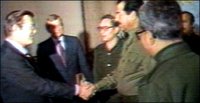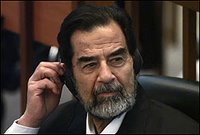
By AHMED YOUSEF ( Senior adviser to the Palestinian prime minister, Ismail Haniya.)
HERE in Gaza, few dream of peace. For now, most dare only to dream of a lack of war. It is for this reason that Hamas proposes a long-term truce during which the Israeli and Palestinian peoples can try to negotiate a lasting peace.
A truce is referred to in Arabic as a “hudna.” Typically covering 10 years, a hudna is recognized in Islamic jurisprudence as a legitimate and binding contract. A hudna extends beyond the Western concept of a cease-fire and obliges the parties to use the period to seek a permanent, nonviolent resolution to their differences. The Koran finds great merit in such efforts at promoting understanding among different people. Whereas war dehumanizes the enemy and makes it easier to kill, a hudna affords the opportunity to humanize one’s opponents and understand their position with the goal of resolving the intertribal or international dispute.
Such a concept — a period of nonwar but only partial resolution of a conflict — is foreign to the West and has been greeted with much suspicion. Many Westerners I speak to wonder how one can stop the violence without ending the conflict.
I would argue, however, that this concept is not as foreign as it might seem. After all, the Irish Republican Army agreed to halt its military struggle to free Northern Ireland from British rule without recognizing British sovereignty. Irish Republicans continue to aspire to a united Ireland free of British rule, but rely upon peaceful methods. Had the I.R.A. been forced to renounce its vision of reuniting Ireland before negotiations could occur, peace would never have prevailed. Why should more be demanded of the Palestinians, particularly when the spirit of our people will never permit it?
When Hamas gives its word to an international agreement, it does so in the name of God and will therefore keep its word. Hamas has honored its previous cease-fires, as Israelis grudgingly note with the oft-heard words, “At least with Hamas they mean what they say.”
This offer of hudna is no ruse, as some assert, to strengthen our military machine, to buy time to organize better or to consolidate our hold on the Palestinian Authority. Indeed, faith-based political movements in Algeria, Egypt, Iraq, Jordan, Kuwait, Malaysia, Morocco, Turkey and Yemen have used hudna-like strategies to avoid expanding conflict. Hamas will conduct itself just as wisely and honorably.
We Palestinians are prepared to enter into a hudna to bring about an immediate end to the occupation and to initiate a period of peaceful coexistence during which both sides would refrain from any form of military aggression or provocation. During this period of calm and negotiation we can address the important issues like the right of return and the release of prisoners. If the negotiations fail to achieve a durable settlement, the next generation of Palestinians and Israelis will have to decide whether or not to renew the hudna and the search for a negotiated peace.
There can be no comprehensive solution of the conflict today, this week, this month, or even this year. A conflict that has festered for so long may, however, be resolved through a decade of peaceful coexistence and negotiations. This is the only sensible alternative to the current situation. A hudna will lead to an end to the occupation and create the space and the calm necessary to resolve all outstanding issues.
Few in Gaza dream. For most of the past six months it’s been difficult to even sleep. Yet hope is not dead. And when we dare to hope, this is what we see: a 10-year hudna during which, inshallah (God willing), we will learn again to dream of peace.
Source


 President George Bush has just announced the resignation of Secretary of Defense Donald Rumsfeld. A senior administration official confirmed the news and said that Rumsfeld had already written out his resignation.
President George Bush has just announced the resignation of Secretary of Defense Donald Rumsfeld. A senior administration official confirmed the news and said that Rumsfeld had already written out his resignation.

 What If Anything Will Count Your Vote
What If Anything Will Count Your Vote
 Saddam Hussein has been convicted of crimes against humanity and sentenced to death by hanging.
Saddam Hussein has been convicted of crimes against humanity and sentenced to death by hanging.












